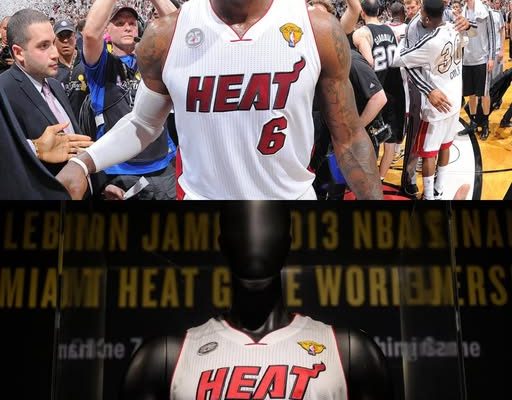In a case that has shocked the sports memorabilia world and rocked the foundations of one of the NBA’s most storied franchises of the last two decades, a former Miami Heat security guard stands accused of orchestrating a brazen, multi-year theft of hundreds of priceless game-worn jerseys and memorabilia—capped off by the stunning disappearance of LeBron James’ 2013 NBA Finals jersey, valued at $3.7 million.
Authorities say the accused, a man entrusted with guarding one of the NBA’s most sacred sanctuaries, quietly siphoned off more than 400 pieces of Heat basketball history, allegedly selling many of them for a fraction of their worth on online marketplaces or through shady under-the-table deals. It is a scandal that combines trust betrayed, legacy diminished, and greed disguised as ignorance—one that may ultimately leave a permanent stain on the legacy of not just the Miami Heat, but the era defined by LeBron James, Dwyane Wade, and Chris Bosh.
According to a recently unsealed federal indictment, the thefts began during the Heat’s 2012–13 championship run—widely considered one of the most iconic seasons in NBA history. At the heart of the heist was the now-infamous jersey worn by LeBron James in Game 7 of the 2013 NBA Finals against the San Antonio Spurs. That white home Heat jersey, soaked in the sweat of legacy, championship pressure, and greatness itself, was worn as LeBron dropped 37 points to clinch his second NBA title and Finals MVP. It had been presumed safely housed in the team’s archives under heavy security.
Until it wasn’t.
The investigation reveals that the security guard, who had worked with the organization for years and held special clearance to access private locker room storage, used his position to slowly and methodically remove game-worn artifacts—jerseys, sneakers, warm-up gear, and autographed apparel—many from playoff and championship games. Some items were from role players, but others were historic, including jerseys from Dwyane Wade’s final home game, shoes worn by Ray Allen during his infamous Game 6 three-point miracle, and even Bosh’s gear from his final Heat season.
What’s perhaps most galling is how little many of these items were allegedly sold for. Court documents detail that dozens of items were offloaded online to collectors and unsuspecting buyers at well below market value—some for a few hundred dollars, others for less than $100.
The $3.7 million LeBron jersey was allegedly sold for just over $12,000.
This is where the case takes a darker turn. Investigators believe the security guard, whom they are now calling one of the most prolific insider sports thieves in U.S. history, may have either knowingly devalued the items to avoid detection or had no true grasp of the treasures in his possession. Either way, the impact is enormous.
It isn’t just about the financial worth. It’s about historical preservation. Sports teams like the Miami Heat keep these jerseys as museum pieces, cultural heirlooms, and reflections of greatness. They are sometimes displayed in Hall of Fame exhibitions, team museums, or auctioned for charity. To lose such items isn’t just a matter of financial theft—it is, in essence, a cultural erasure.
Heat executives issued a statement expressing “outrage and heartbreak” over the thefts and vowed to do everything within their power to reclaim the stolen items. “The Miami Heat organization prides itself on the integrity of our franchise and the history we’ve built with our fans. These items are sacred,” the team said. “To have them taken by someone from within our own family is a betrayal we are still processing.”
LeBron James himself has not made a public statement, but sources close to him indicate he was “deeply saddened” to learn of the missing jersey. For a player who has always understood and respected the significance of legacy and symbolism, the jersey represented one of the most defining moments of his career.
As the investigation deepens, the FBI and U.S. Attorney’s Office are working closely with memorabilia experts and digital marketplaces to track down where the items ended up. Already, several jerseys have been recovered from private collections after it was determined that they had been illegally acquired. Some collectors are cooperating willingly; others are lawyering up.
The case is also prompting a broader reckoning within the NBA and the wider sports world. How secure are locker room archives? How do teams vet those who have access to priceless memorabilia? Should game-worn items be registered and tracked with more rigor?
The scandal highlights a growing issue in the world of sports collectibles, where values are skyrocketing and authentication systems have not caught up with the demand. In an age where LeBron James’ rookie cards are selling for millions and Michael Jordan’s game-worn shoes from a regular-season game fetch six figures, a black market driven by greed and under-regulation continues to thrive.
This isn’t the first time high-value memorabilia has gone missing. Over the past decade, numerous scandals have rocked the industry—from the theft of Tom Brady’s Super Bowl jersey in 2017, which was recovered in Mexico, to counterfeit scandals involving MLB and boxing. But what makes this case especially painful is that it happened in-house, from someone expected to protect the very things they were stealing.
Legal experts believe the accused could face serious federal charges, including interstate trafficking of stolen goods and conspiracy to defraud. Depending on the value attributed to the items, sentencing could include up to 20 years in prison.
Meanwhile, the Miami Heat, their players past and present, and a stunned NBA community are left grappling with what has been lost—not just in material terms, but in trust and history. Fans often view sports as a source of continuity and reverence, with relics serving as bridges between generations. To see that desecrated from within by someone charged with guarding it is a stark reminder that even in the realm of sports—where loyalty, honor, and brotherhood are preached daily—greed can still steal the show.
As the case continues to unravel, one thing is clear: the saga of the stolen Heat treasures, especially LeBron’s $3.7 million Finals jersey, will be remembered not just as a theft, but as a symbol of how even the most sacred artifacts of modern sports can vanish in a moment of betrayal. The heist in the Heat house isn’t just about one man’s actions—it’s a cautionary tale for an entire industry.



